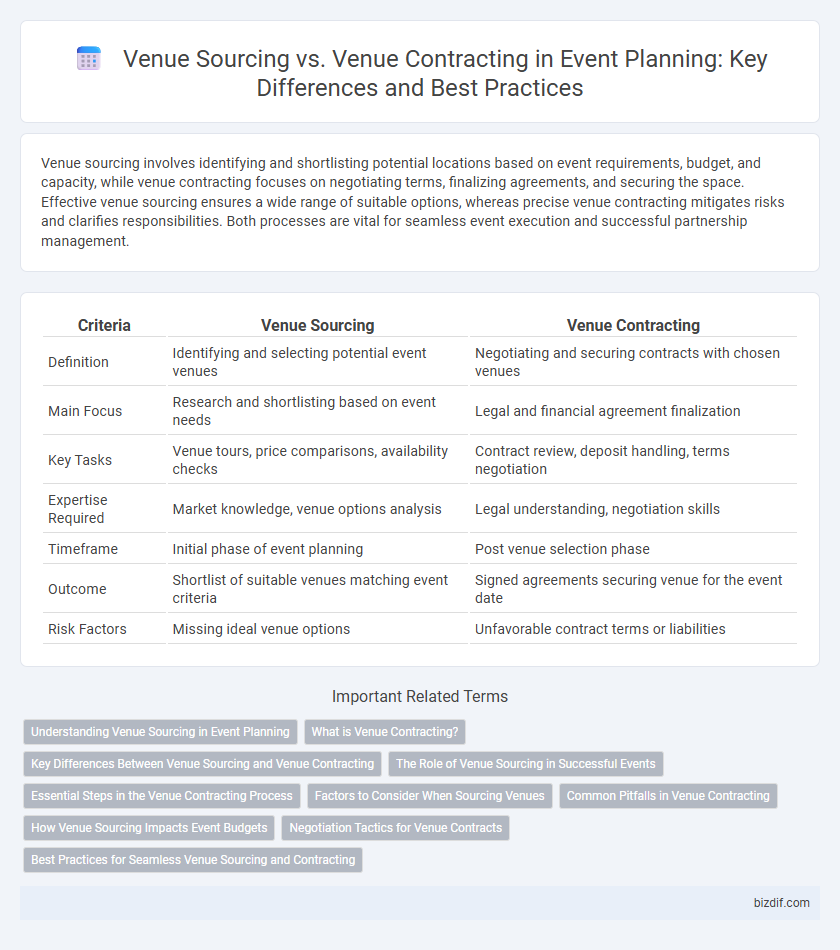Venue sourcing involves identifying and shortlisting potential locations based on event requirements, budget, and capacity, while venue contracting focuses on negotiating terms, finalizing agreements, and securing the space. Effective venue sourcing ensures a wide range of suitable options, whereas precise venue contracting mitigates risks and clarifies responsibilities. Both processes are vital for seamless event execution and successful partnership management.
Table of Comparison
| Criteria | Venue Sourcing | Venue Contracting |
|---|---|---|
| Definition | Identifying and selecting potential event venues | Negotiating and securing contracts with chosen venues |
| Main Focus | Research and shortlisting based on event needs | Legal and financial agreement finalization |
| Key Tasks | Venue tours, price comparisons, availability checks | Contract review, deposit handling, terms negotiation |
| Expertise Required | Market knowledge, venue options analysis | Legal understanding, negotiation skills |
| Timeframe | Initial phase of event planning | Post venue selection phase |
| Outcome | Shortlist of suitable venues matching event criteria | Signed agreements securing venue for the event date |
| Risk Factors | Missing ideal venue options | Unfavorable contract terms or liabilities |
Understanding Venue Sourcing in Event Planning
Venue sourcing in event planning involves identifying and evaluating potential locations that align with the event's objectives, budget, and attendee needs. It requires thorough research on venue capacity, amenities, accessibility, and availability to ensure a seamless fit for the event type and size. Effective venue sourcing lays the foundation for successful event execution before proceeding to the contracting phase, where formal agreements and negotiations are conducted.
What is Venue Contracting?
Venue contracting involves negotiating and finalizing legally binding agreements with selected venues to secure dates, pricing, and specific event requirements. This process includes reviewing terms, managing deposits, and ensuring compliance with both client needs and venue policies. Effective venue contracting minimizes risks and guarantees that the event space is reserved under favorable conditions for the organizer.
Key Differences Between Venue Sourcing and Venue Contracting
Venue sourcing involves researching and selecting potential locations that meet the event's requirements, focusing on factors such as capacity, location, amenities, and budget. Venue contracting, on the other hand, entails negotiating terms, finalizing agreements, and securing the venue through formal contracts that outline responsibilities, pricing, and cancellation policies. Understanding these distinctions ensures efficient event execution by aligning strategic selection with legal and financial commitments.
The Role of Venue Sourcing in Successful Events
Venue sourcing plays a critical role in successful event planning by identifying locations that align with event objectives, budget, and guest experience. Effective venue sourcing involves detailed market research, site evaluations, and negotiating terms that support logistics and attendee satisfaction. This process ensures that the chosen venue enhances the event's impact while streamlining subsequent contracting and operational phases.
Essential Steps in the Venue Contracting Process
Venue sourcing involves identifying and evaluating potential locations based on event requirements and budget constraints, while venue contracting focuses on finalizing terms and legal agreements. Essential steps in the venue contracting process include negotiating fees and services, reviewing contract clauses such as cancellation policies and liability, and obtaining necessary approvals and signatures to secure the venue. Thorough contract management ensures risk mitigation and clear expectations between event planners and venue providers.
Factors to Consider When Sourcing Venues
When sourcing venues for event planning, consider location accessibility, capacity limits, and available amenities to ensure alignment with the event's goals. Evaluate the venue's reputation, flexibility with dates, and cost transparency to avoid unexpected expenses and logistical issues. Prioritize venues that support necessary technical requirements and comply with legal and safety regulations to guarantee a smooth event execution.
Common Pitfalls in Venue Contracting
Venue contracting often involves common pitfalls such as unclear cancellation policies, hidden fees, and ambiguous liability clauses that can lead to unexpected costs and disputes. Failing to thoroughly review contract terms or relying solely on verbal agreements increases the risk of misunderstandings between event planners and venue providers. Ensuring detailed negotiation and legal review of venue contracts is critical to avoid financial loss and logistical complications.
How Venue Sourcing Impacts Event Budgets
Venue sourcing directly influences event budgets by identifying cost-effective locations that meet event requirements while maximizing value. Efficient venue sourcing involves negotiating rates, evaluating hidden fees, and comparing multiple options to prevent budget overruns. Strategic sourcing minimizes unexpected expenses, ensuring budget alignment and optimizing overall event financial planning.
Negotiation Tactics for Venue Contracts
Effective negotiation tactics for venue contracts hinge on thorough market research to understand comparable rates and services, leveraging this data to negotiate favorable terms. Prioritizing clear communication about event needs and potential contingencies enables flexibility in pricing, cancellation policies, and added-value services. Employing a detailed contract checklist ensures key clauses on deposits, liability, and exclusivity are addressed, minimizing financial risks and contractual ambiguities.
Best Practices for Seamless Venue Sourcing and Contracting
Thorough venue sourcing involves detailed research and comparison of locations based on capacity, amenities, and accessibility to ensure alignment with event goals. Best practices for venue contracting emphasize clear negotiation of terms, including cancellation policies, liability clauses, and payment schedules to minimize risks. Leveraging technology for digital contract management and maintaining open communication between event planners and venue representatives streamlines the entire process, resulting in a seamless experience.
Venue sourcing vs venue contracting Infographic

 bizdif.com
bizdif.com